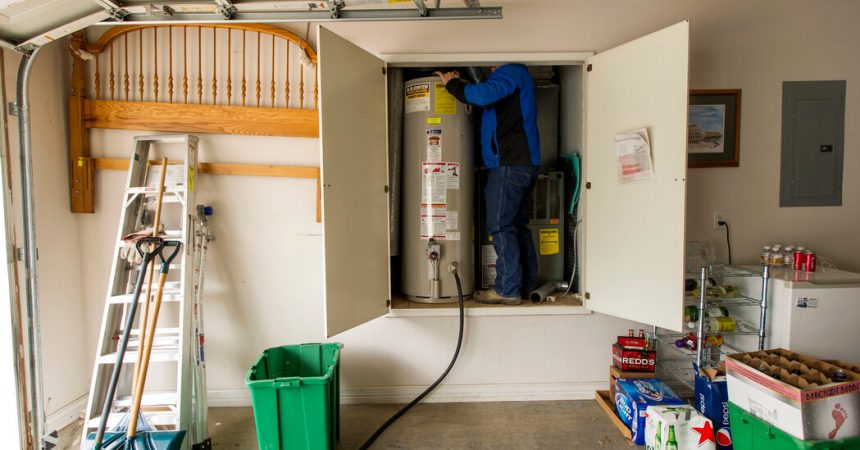The Biden administration on Tuesday adopted stricter energy-efficiency standards for residential water heaters, the most consequential move in a flurry of changes designed to reduce the energy used by many common appliances including stoves, dishwashers and lightbulbs.
The Department of Energy said the new standards, taken together, will save American households and businesses nearly $1 trillion over 30 years, and save the average family $100 a year or more through lower utility bills. The changes will also cut greenhouse gas emissions, the agency said, by an amount equivalent to taking 18 million gas-burning cars off the road over that time.
However, the changes have come under withering attack by Republican lawmakers who claim the new rules will make appliances costlier in the short term. Late last year several representatives introduced legislation with names including the “Hands Off Our Home Appliances Act,” the “Liberty in Laundry Act” and the “Stop Unaffordable Dishwasher Standards Act.”
The proposed legislation was just the latest salvo in a long running fight waged by conservative groups and politicians who claim the standards limit consumer choice. Republican politicians and their allies have accused the administration of planning to ban gas stoves, for example, and conservative groups have blamed environmental rules for what it claimed was the decline of the American dishwasher.
The new standards are part of President Biden’s “radical environmentalist agenda” and would “deny American consumers the choices they deserve,” Rep. Debbie Lesko of Arizona, who proposed the Hands Off Our Home Appliances Act, told the House Energy and Commerce Committee in December.
There is no gas stove ban. Rather, the D.O.E.’s final energy-efficiency guidelines for gas stoves amounted to a slight tightening of older standards, and about 97 percent of models on the market already meet those standards. Updates to dishwasher standards have also been modest, based on a compromise between manufacturers and efficiency advocates.
Consumer Reports, a nonprofit that does independent product testing, has found that more energy-efficient washers and dryers perform no worse on average than their less efficient counterparts.
“Most of these standards haven’t been updated for more than a decade,” said Andrew deLaski, executive director of the Appliance Standards Awareness Project, a nonprofit that advocates for stricter energy-efficiency guidelines. “The technology has gotten so much better but there are still products sold now that use a lot more energy to do the same job.”
Still, the political pushback has gained some traction. In January, the U.S. Court of Appeals for the Fifth Circuit sided with a group of 11 states, led by Louisiana, ordering the Biden administration to revisit its efforts to rework dishwasher and washing-machine efficiency standards.
Household appliances are a big deal for energy use and for climate change. Homes and commercial buildings consume 40 percent of the energy used in the United States, and most of that energy is used by appliances and equipment like water heaters. Generating that electricity produces a lot of greenhouse gas emissions, which are causing the world to warm dangerously.
As one of the largest users of energy in American homes, more efficient residential water heaters are expected to bring the largest savings ever from a single D.O.E. rule standard. The new rules would shift most new electric water heaters to heat-pump technology, which typically uses less than half the amount of electricity that many older models use. The new rules also require gas-burning water heaters to meet more stringent standards.
Over 30 years of shipments, the new standards are expected to save Americans $124 billion on energy bills, and reduce as much planet-warming carbon dioxide emissions as 43 million homes would generate in a year. Replacing traditional water heaters with electric heat-pump water heaters would save households approximately $1,800 on their utility bills, on average, over the life of the appliance, the D.O.E. said.
To encourage people to replace older machines, the Inflation Reduction Act, a climate law passed by Congress in 2022, includes $4.5 billion in rebates for households to buy new appliances.
“Almost every U.S. household has a water heater, and for too long outdated energy-efficiency standards have led to higher utility bills for families,” said U.S. Secretary of Energy Jennifer M. Granholm. “The Biden-Harris Administration is continuing to put American consumers first with new, effective rules — supported by industry — that save both energy and money.”
Under the Energy Policy and Conservation Act of 1975, signed into law by Gerald R. Ford, a Republican, the Department of Energy is required to regularly update minimum efficiency standards for a wide range of appliances used in both residential and commercial buildings. Those standards compel product designers and manufacturers to make appliances and equipment that use less energy and water.
The Trump administration stalled those updates, amid its wider policy of rolling back environmental regulations. The Biden administration is now playing catch-up, updating efficiency standards on ceiling fans, lamps and air-conditioners, as well as commercial walk-in coolers and vending machines for refrigerated drinks.






